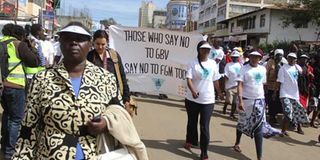Donors join fight against FGM in Samburu County

Participants march during an anti-female genital mutilation awareness campaign. The World Health Organization on Monday released its first-ever guidelines on how medical professionals should treat victims of female genital mutilation. PHOTO | JARED NYATAYA | NATION MEDIA GROUP
What you need to know:
- The Netherlands, Danish, French and the US governments together with The Nature Conservancy have provided funds for the ambitious programme.
- The move follows a declaration by elders in a two-day meeting at Kisima Primary School that FGM must be practiced at all times so as to help preserve the Samburu culture.
- About 200 girls and babies have been rescued from female genital mutilation and arranged marriages.
- The new anti-FGM campaign is aimed at increasing the enrolment of girls in schools by closely working with community leaders to end harmful cultural practices.
Three foreign governments have partnered with two non-governmental organisations in the fight against female genital mutilation (FGM) in Samburu County, days after elders expressed support for the prohibited practice.
The Dutch, Danish, French and the US governments, together with a US-based pro-wildlife conservation lobby, the Nature Conservancy, have provided funds for the ambitious programme.
It is aimed at empowering women to become agents of change through their participation in decision making at all levels.
In its New Year dispatch, the Northern Rangelands Trust (NRT-Kenya) said it will jointly work with the Samburu Girls Foundation in encouraging women to lead the anti-FGM war in the villages.
The move follows a declaration by elders in a two-day meeting at Kisima Primary School that FGM must be practiced at all times so as to help preserve the Samburu culture.
NRT-Kenya said the move was in line with its strategic plan that women in all 26 community-run conservancies be involved in the anti-FGM war and also be empowered to take over leadership so as to act as role models and agents of change in their communities.
WOMEN MOSTLY IGNORED
NRT’s community development officer, Gabriel Nyausi, said that getting women more involved in community conservation, both at decision-making levels and at a household level, was a big challenge since many communities ignore women’s contribution.
“For a girl born in rural northern Kenya, the chance of getting higher education is a rare one. Statistics show she is far more likely to feel the burden of an early arranged marriage (often to men three times her age), household chores, teenage childbirth and female genital mutilation.
“These factors affect a woman’s chances of earning an independent income and taking on leadership roles within the local community,” he said.
Saying women play a crucial role in the future of conservation, Naibunga Community Conservancy manager Ms Beatrice Lempaira, said the role of women as a unifying factor within the households must be utilised for the betterment of society.
“They can be a powerful tool in conflict resolution and, moreover, women have a right to be involved in community conservancy decision-making. There should be widespread awareness-raising of how they can exercise this right,” said Ms Lempaira.
About 200 girls and babies have been rescued from female genital mutilation and arranged marriages, with some girls as young as nine being forced to marry older men in the usually polygamous relationships.
The new anti-FGM campaign is aimed at increasing the enrolment of girls in schools by closely working with community leaders to end harmful cultural practices.





